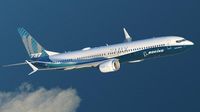The ongoing trade war between the United States and China has taken a significant turn as the Chinese government has ordered its airlines to halt the purchase of aircraft from American manufacturer Boeing. This decision, announced on April 15, 2025, is seen as a direct retaliation against the U.S. for imposing steep tariffs of up to 145% on Chinese products under the administration of former President Donald Trump.
According to Bloomberg, the Civil Aviation Administration of China (CAAC) has not only instructed airlines to stop placing new orders for Boeing jets but also suspended the delivery of already contracted aircraft and parts from U.S. companies. This move highlights the escalating tensions in the trade relationship between the two nations, which have been marked by a series of tit-for-tat tariffs.
As a result of this announcement, Boeing's shares fell by 2.36% on the New York Stock Exchange shortly after the market opened, reflecting investors' concerns over the company's future in one of its most crucial markets. The situation has created a ripple effect in the aviation industry, with Boeing's stock experiencing a decline of up to 4.6% in pre-market trading, leading to an accumulated devaluation of 10% for the year.
China represents a vital market for Boeing, with the company estimating that the Asian nation will account for approximately 20% of global aircraft deliveries over the next two decades. In fact, out of the 130 aircraft delivered by Boeing in 2025, 18 were destined for Chinese airlines. However, the recent developments threaten to disrupt Boeing’s supply chain and its plans for future deliveries.
The Chinese government's directive is particularly impactful for the three main airlines in the country: Air China, China Eastern Airlines, and China Southern Airlines, which had plans to incorporate a total of 179 Boeing aircraft into their fleets by 2027. With these plans now frozen, Boeing faces a significant setback in meeting its delivery schedules.
Meanwhile, the news has been favorable for Boeing's competitors. The European manufacturer Airbus is likely to benefit from the situation, as it already holds a strong presence in the Chinese market. Additionally, Brazilian manufacturer Embraer saw its shares rise by 3.06% on the B3 stock exchange, with its stock quoted at R$ 64.65 on April 15, 2025. The Brazilian company is poised to potentially fill the gap left by Boeing's absence in the Chinese market.
The backdrop of this trade conflict is marked by increasing regulatory requirements and reputational damage for Boeing, stemming from previous safety failures, including two fatal accidents involving the 737 Max model in 2018 and 2019. The company has struggled to regain market confidence and has not reported an annual profit since these incidents. Furthermore, a recent incident involving a door explosion on a 737 Max operated by Alaska Airlines led to federal scrutiny and further delays in aircraft deliveries.
In December 2024, a tragic accident in South Korea that resulted in the deaths of 179 people reignited safety concerns surrounding Boeing's aircraft. The company also faced a nearly two-month strike between September and November 2024, which severely impacted its production capabilities and financial results. In the last quarter of 2024 alone, Boeing reported a staggering loss of $3.86 billion, contributing to an annual loss of $11.83 billion, the worst financial performance since 2020.
In response to the escalating trade tensions, President Trump took to his Truth Social platform to denounce China's actions, accusing the country of reneging on trade agreements and treating American farmers and Boeing unfairly. He stated, "Our farmers are great, but always put on the front lines. China has no respect for our country under Democratic governments." This rhetoric underscores the political dimensions of the trade war and its implications for domestic audiences.
The Chinese government is also exploring ways to support local airlines that lease Boeing jets and are facing increased costs due to the new tariffs. This support could include financial assistance to mitigate the impact of the trade war on Chinese carriers, which are now grappling with rising operational costs.
As the trade war continues to unfold, analysts warn of the potential for a complete halt in bilateral trade, which accounted for over $650 billion in 2024. The aviation sector has emerged as a strategic battleground in this conflict, illustrating how commercial interests are intertwined with broader geopolitical tensions.
With the global aviation market in a state of flux, the future for Boeing remains uncertain. The company is committed to regaining market confidence and aims to achieve positive cash flow by 2025, as stated by CEO Kelly Ortberg. However, the challenges posed by the current geopolitical climate and the ongoing trade war may complicate these efforts.
In summary, the suspension of Boeing aircraft purchases by Chinese airlines marks a significant escalation in the trade war between the United States and China, with far-reaching implications for the aviation industry and beyond. As both nations navigate this complex landscape, the outcomes will likely shape the future of international trade and economic relations.








